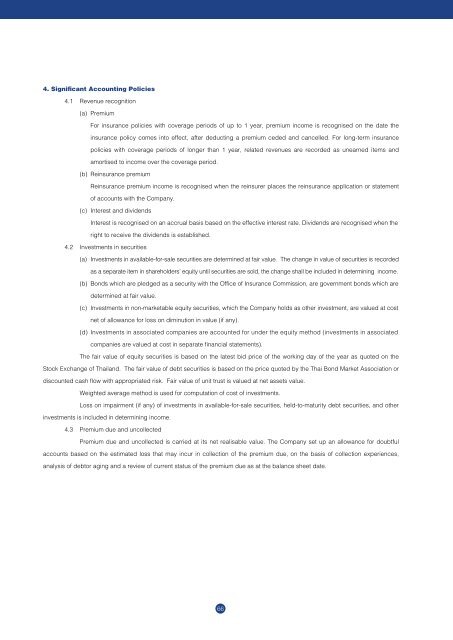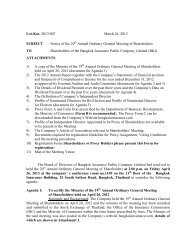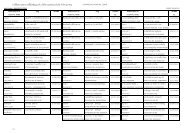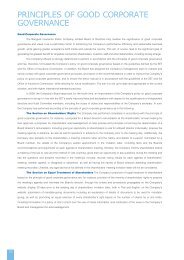Year 2007
Year 2007
Year 2007
You also want an ePaper? Increase the reach of your titles
YUMPU automatically turns print PDFs into web optimized ePapers that Google loves.
4. Significant Accounting Policies<br />
4.1 Revenue recognition<br />
(a) Premium<br />
For insurance policies with coverage periods of up to 1 year, premium income is recognised on the date the<br />
insurance policy comes into effect, after deducting a premium ceded and cancelled. For long-term insurance<br />
policies with coverage periods of longer than 1 year, related revenues are recorded as unearned items and<br />
amortised to income over the coverage period.<br />
(b) Reinsurance premium<br />
Reinsurance premium income is recognised when the reinsurer places the reinsurance application or statement<br />
of accounts with the Company.<br />
(c) Interest and dividends<br />
Interest is recognised on an accrual basis based on the effective interest rate. Dividends are recognised when the<br />
right to receive the dividends is established.<br />
4.2 Investments in securities<br />
(a) Investments in available-for-sale securities are determined at fair value. The change in value of securities is recorded<br />
as a separate item in shareholders’ equity until securities are sold, the change shall be included in determining income.<br />
(b) Bonds which are pledged as a security with the Office of Insurance Commission, are government bonds which are<br />
determined at fair value.<br />
(c) Investments in non-marketable equity securities, which the Company holds as other investment, are valued at cost<br />
net of allowance for loss on diminution in value (if any).<br />
(d) Investments in associated companies are accounted for under the equity method (investments in associated<br />
companies are valued at cost in separate financial statements).<br />
The fair value of equity securities is based on the latest bid price of the working day of the year as quoted on the<br />
Stock Exchange of Thailand. The fair value of debt securities is based on the price quoted by the Thai Bond Market Association or<br />
discounted cash flow with appropriated risk. Fair value of unit trust is valued at net assets value.<br />
Weighted average method is used for computation of cost of investments.<br />
Loss on impairment (if any) of investments in available-for-sale securities, held-to-maturity debt securities, and other<br />
investments is included in determining income.<br />
4.3 Premium due and uncollected<br />
Premium due and uncollected is carried at its net realisable value. The Company set up an allowance for doubtful<br />
accounts based on the estimated loss that may incur in collection of the premium due, on the basis of collection experiences,<br />
analysis of debtor aging and a review of current status of the premium due as at the balance sheet date.<br />
66







